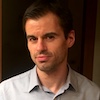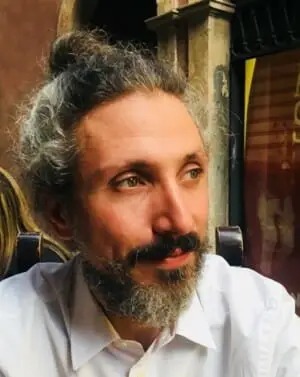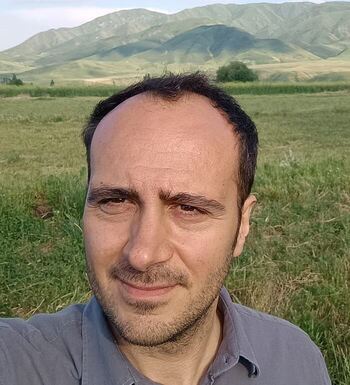Studying at the University of Verona
Here you can find information on the organisational aspects of the Programme, lecture timetables, learning activities and useful contact details for your time at the University, from enrolment to graduation.
Academic calendar
The academic calendar shows the deadlines and scheduled events that are relevant to students, teaching and technical-administrative staff of the University. Public holidays and University closures are also indicated. The academic year normally begins on 1 October each year and ends on 30 September of the following year.
Course calendar
The Academic Calendar sets out the degree programme lecture and exam timetables, as well as the relevant university closure dates..
| Period | From | To |
|---|---|---|
| Sem. 1A | Sep 21, 2020 | Oct 31, 2020 |
| Sem. 1B | Nov 9, 2020 | Jan 9, 2021 |
| Sem. 2A | Feb 15, 2021 | Apr 1, 2021 |
| Sem. 2B | Apr 14, 2021 | May 29, 2021 |
| Session | From | To |
|---|---|---|
| Sessione d'esame invernale | Jan 14, 2021 | Feb 13, 2021 |
| Sessione d'esame estiva | Jun 7, 2021 | Jul 24, 2021 |
| Sessione d'esame autunnale | Aug 23, 2021 | Sep 18, 2021 |
| Session | From | To |
|---|---|---|
| Sessione di laurea estiva | Jul 5, 2021 | Jul 10, 2021 |
| Sessione di laurea autunnale | Nov 8, 2021 | Nov 13, 2021 |
| Sessione di laurea invernale | Mar 28, 2022 | Apr 1, 2022 |
| Period | From | To |
|---|---|---|
| Festa di Ognissanti | Nov 1, 2020 | Nov 1, 2020 |
| Festa dell'Immacolata | Dec 8, 2020 | Dec 8, 2020 |
| Vacanze di Natale | Dec 24, 2020 | Jan 6, 2021 |
| Vacanze di Pasqua | Apr 2, 2021 | Apr 6, 2021 |
| Festa della liberazione | Apr 25, 2021 | Apr 25, 2021 |
| Festa del lavoro | May 1, 2021 | May 1, 2021 |
| Festa del Santo Patrono | May 21, 2021 | May 21, 2021 |
| Festa della Repubblica | Jun 2, 2021 | Jun 2, 2021 |
| Vacanze estive | Aug 9, 2021 | Aug 15, 2021 |
Exam calendar
Exam dates and rounds are managed by the relevant Humanistic Studies Teaching and Student Services Unit.
To view all the exam sessions available, please use the Exam dashboard on ESSE3.
If you forgot your login details or have problems logging in, please contact the relevant IT HelpDesk, or check the login details recovery web page.
Should you have any doubts or questions, please check the Enrollment FAQs
Academic staff
 francesco.bianchi@univr.it
francesco.bianchi@univr.it
 bonifacio@teologiaverona.it
bonifacio@teologiaverona.it
 evita.calabrese@univr.it
evita.calabrese@univr.it
 andrea.cavalletti@univr.it
andrea.cavalletti@univr.it
 francesco.lupi@univr.it
francesco.lupi@univr.it

Mastrocinque Attilio
 attilio.mastrocinque@univr.it
attilio.mastrocinque@univr.it
 +39 045802 8386
+39 045802 8386
 linda.napolitano@univr.it
linda.napolitano@univr.it
 pieralberto.porcedducilione@univr.it; pierre_pordd@yahoo.it
pieralberto.porcedducilione@univr.it; pierre_pordd@yahoo.it
 045 8028732
045 8028732
 nicola.turrini@univr.it
nicola.turrini@univr.it
 lucia.vantini@univr.it
lucia.vantini@univr.it
 mariarenata.zanchin@univr.it
mariarenata.zanchin@univr.it
Study Plan
The Study Plan includes all modules, teaching and learning activities that each student will need to undertake during their time at the University.
Please select your Study Plan based on your enrollment year.
1° Year
| Modules | Credits | TAF | SSD |
|---|
Other activities2° Year activated in the A.Y. 2021/2022
| Modules | Credits | TAF | SSD |
|---|
1 module to be chosen between the following1 module to be chosen between the following3 modules to be chosen among the following3° Year activated in the A.Y. 2022/2023
| Modules | Credits | TAF | SSD |
|---|
3 modules to be chosen among the following1 module to be chosen between the following| Modules | Credits | TAF | SSD |
|---|
Other activities| Modules | Credits | TAF | SSD |
|---|
1 module to be chosen between the following1 module to be chosen between the following3 modules to be chosen among the following| Modules | Credits | TAF | SSD |
|---|
3 modules to be chosen among the following1 module to be chosen between the following| Modules | Credits | TAF | SSD |
|---|
2 modules to be chosen among the following3 modules to be chosen among the followingLegend | Type of training activity (TTA)
TAF (Type of Educational Activity) All courses and activities are classified into different types of educational activities, indicated by a letter.
Laboratory of Philosophy of Arts and Music (2020/2021)
Teaching code
4S007329
Teacher
Coordinator
Credits
3
Language
Italian
Scientific Disciplinary Sector (SSD)
M-FIL/04 - AESTHETICS
Period
Sem. 2B dal Apr 14, 2021 al May 29, 2021.
Learning outcomes
Workshop on Philosophy of Art and Music
The workshop aims to give students who are actively involved in it a knowledge of philosophical thought that from the German eighteenth century onwards has been confronted in general with artistic practice and, in particular, with musical composition. In this sense, students enhance their knowledge of the main lines of Western aesthetics, by acquiring specific knowledge of certain philosophical theories and artistic, aesthetic or poetic practices. Students will also enhance their comprehension of the status of art, and the power of aesthetical experience to understand the world and transform it, thus empowering themselves with more autonomous judgement skills on specific cultural issues, such as artistic practice and, in particular, musical composition.
Program
SYLLABUS
ELECTROACOUSTIC MUSIC
During the twentieth century music has not only experienced a revolution in expressive codes, but has also seen the emergence of a new dimension of sound: electro-acoustic music. Musical technologies, from the simple mechanical reproduction of sound to the most recent possibilities of digital manipulation, have given an epochal change to the way we relate to the creation and enjoyment of music. How does our relationship to music change, if the experience of musical sound is now almost totally mediated by technological means? What categories should musical aesthetics use to understand these mutations? Is it possible to create masterpieces in the era of the digitalization of the musical experience?
No prior knowledge and skills are deemed necessary.
Literature:
W. Benjamin, L’opera d’arte nell’epoca della sua riproducibilità tecnica, Einaudi, Torino 2000; oppure: BUR 2013
F. Galante, N. Sani, Musica espansa. Percorsi elettroacustici di fine millennio, Ricordi-MBG, Mi-lano 2000
AA. VV., La musica elettronica, Testi scelti e commentati da H. Pousseur, prefazione di L. Berio, Milano, Feltrinelli 1976
G. Fronzi, Electrosound. Storia ed estetica della musica elettroacustica, EDT, Torino 2013
E. Varèse, Il suono organizzato, Ricordi LIM, Milano 1985
H. Dufourt, Musica, potere, scrittura, Ricordi LIM, Milano 1997
P. Boulez, Répons, Universal Edition, Wien
L. Nono, Prometeo, Ricordi, Milano
S. Sciarrino, Cantare con silenzio, Ricordi, Milano
No prior knowledge and skills are deemed necessary.
DIDACTIC MODES
Since this is a Seminary, the didactic methods adopted are addressing exclusively attend-ing students. They consist of one frontal introductory lesson and one or two lessons held by professionals of the musical sector (singers, conductors of choirs etc.). During the other lessons the students will hold singular presentations of the chosen writings and discuss them in class. In this way fundamental concepts and structures of thinking and reflection and their respective application tools to implement theoretical notions in the direction of autonomous critical judgment will be elaborated by the students themselves under the guidance of the teacher.
Throughout the academic year, the teacher also holds a regular individual Reception at the times indicated on his page (without having to set a specific appointment). However, it is recommended that you consult the messages to be informed of any changes. During the first lesson, attending students will receive the full lesson schedule with the dates and top-ics discussed. Information on timetables and classrooms is also provided.
The content of books and lessons is adhering to the program.
| Author | Title | Publishing house | Year | ISBN | Notes |
|---|---|---|---|---|---|
| S. Sciarrino | Cantare con silenzio | ||||
| G. Fronzi | Electrosound. Storia ed estetica della musica elettroacustica | 2013 | |||
| E. Varèse | Il suono organizzato | 1985 | |||
| Henri Pousseur (a cura di) | La musica elettronica | 1976 | |||
| Walter Benjamin | L'opera d'arte nell'epoca della sua riproducibilità tecnica | BUR | 2013 | ||
| F. Galante, N. Sani | Musica espansa. Percorsi elettroacustici di fine millennio | 2000 | |||
| H. Dufourt | Musica, potere, scrittura | 1997 | |||
| L. Nono | Prometeo | ||||
| P. Boulez | Répons |
Examination Methods
In order to obtain the credits the students have to relate on a chosen text pertinent to the thematic of the Seminary and discuss it with the others. Furthermore, the students should participate at the lessons.
Type D and Type F activities
Modules not yet included
Career prospects
Module/Programme news
News for students
There you will find information, resources and services useful during your time at the University (Student’s exam record, your study plan on ESSE3, Distance Learning courses, university email account, office forms, administrative procedures, etc.). You can log into MyUnivr with your GIA login details: only in this way will you be able to receive notification of all the notices from your teachers and your secretariat via email and also via the Univr app.
Student mentoring
Linguistic training CLA
Gestione carriere
Practical information for students
Documents
| Title | Info File |
|---|---|
|
|
pdf, it, 325 KB, 16/07/24 |
|
|
pdf, it, 212 KB, 02/05/23 |
|
|
pdf, it, 131 KB, 02/05/23 |
Graduation
Documents
| Title | Info File |
|---|---|
|
|
pdf, it, 109 KB, 12/07/24 |
|
|
pdf, it, 112 KB, 14/05/24 |







































